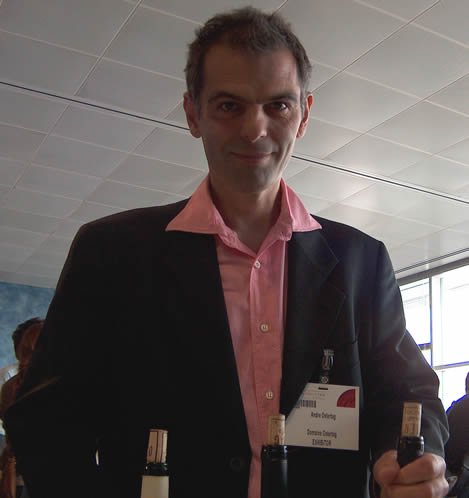|
The wines
of André
Ostertag, Alsace
Domaine Ostertag, 87 Rue Finkwillwer, 67680 Epfig,
France
E-mail: domaine-ostertag@wanadoo.fr

André Ostertag has been running his Domaine along
biodynamic lines since 1998, although it's not easy to fit him into
the usual biodynamic pigeonhole: he doesn't look and talk biodynamic.
This fairly young domaine, which began life in the 1960s, has 13 hectares of vines split among
75 plots in five villages. The wines are quite simply brilliant, as I
hope the tasting notes below make clear.
‘More and more wine is becoming two markets’,
maintains Ostertag. ‘Industrial wines made by recipes and then real
wine’. He thinks that this trend isn’t just confined to wine, but
is applicable to other markets. ‘Globalization has created a big
mass market and then a top educated market’.
I asked Andre about the vins sans soufre movement, which is gaining ground among artisanal
producers who eschew the use of sulfur dioxide and other additives in
wine making. ‘Sans soufre is a fashion in France’, he says.
‘Sulfur is the devil. It’s a simple message for the public’.
‘You can’t make white wines without sulfur’, he
states. ‘For a red wine with high tannins you can do it, and for
white wines you can do it but only for a local market but then you
have to drink it fast. It would be difficult to do my wines without
sulfur.’
Ostertag filters his wines, as almost everyone in
Alsace has to, because they usually bottle with some residual sugar.
Even for the dry styles, it is advisable. ‘I don’t take the risk
of not filtering wines that are dry’, he explains. ‘In 1988 I made
a wine with 18 g/litre residual sugar that was stable in the lab. It
was bottled unfiltered and 100 cases were sent to the USA. I had to
take all of them back.’
Does he think that the grape
variety is important, or like some other Alsace growers he is moving
towards the view that it’s the terroir that’s all important and
the cepage doesn’t really matter that much. ‘I believe cepage is
important’, he says. ‘I like music, but what type of music?’
In the past Ostertag has been criticized for his use of
new oak barrels for making Alsace wines. ‘I’ve had problems with
this in the past’, he admits. ‘Open-minded people understand this,
but the French are mostly closed-minded people!’ He’s tried
barrels for Riesling and found that it doesn’t work, but the results
with Pinots Gris and Blanc are pretty good.
Ostertag
Pinot Blanc Barriques 2004
Rounded smooth fruity nose is quite creamy and full.
The palate is full and rich with a nice spiciness to the rich fruit.
There’s a subtle herby edge and a bit of toastiness. Lovely. Very
good/excellent 91/100
Ostertag
Zellberg Pinot Gris 2002
Lovely complex, rich perfumed nose with smooth, sweet
herb-tinged fruit. The palate is concentrated and full with lovely
fruit richness, a bit of nuttiness and a spicy finish. Just off-dry.
Very good/excellent 93/100
Ostertag
Muenchberg Grand Cru Riesling 2002
Rich, honeyed sweet fruit on the nose with a fresh,
lemony edge. The palate is full and broad with lovely complex, rich
fruit backed up by lemony freshness. Mostly dry; lovely and long. Very
good/excellent 94/100
Ostertag
Gewürztraminer Vignoble d’E
Intense, rich nose is grapey with a grapefruit
freshness and some floral characters. The palate is very rich and
smooth. Fat textured in an off-dry style. Impressive wine. Very
good/excellent 92/100
Wines tasted 05/06
Find
these wines with wine-searcher.com
Back to top
|

